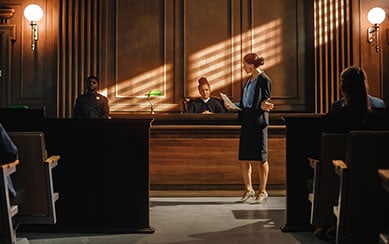 After the arraignment the next court date is usually there for a status conference with the judge and the prosecutor or for what is called a pre-trial conference. Now if it’s set for a status conference, my client is not required to be there. If it’s a pre-trial conference, the judge in San Francisco is requiring that my client show up. Unless they live, say the other side of the state or I should say Southern California or San Diego or if they live out of state, then my client is not always required to be there.
After the arraignment the next court date is usually there for a status conference with the judge and the prosecutor or for what is called a pre-trial conference. Now if it’s set for a status conference, my client is not required to be there. If it’s a pre-trial conference, the judge in San Francisco is requiring that my client show up. Unless they live, say the other side of the state or I should say Southern California or San Diego or if they live out of state, then my client is not always required to be there.
With DUI Cases, the Case Is Resolved by Going to Trial or Accepting a Plea Bargain from the Prosecutor
At some point, and these cases can go on for six months to two years, they can go on for a long time, but we will get a disposition of the case. That’s either by going to jury trial, obviously the goal there is to win the case or by having enough conferences so that we’ve been able to resolve the case and get the best result possible for our clients.
More Recently in San Francisco, the Prosecutors Rescind Their Offer If It Is Not Quickly Accepted
One of the problems with San Francisco is once we go to a pre-trial conference the DA’s office, and they’ve been doing this for the last couple years now, they will pull the offer off the table. I frown upon this process but they’re trying to do it to speed up the process.
The Defense Attorney Typically Declines the Initial Offer by the Prosecutor to Allow for Time to Investigate the Circumstances of the Arrest
When we go to the arraignment in most cases the DA’s office will have an offer if the client will plead guilty. In most cases we will say, in almost all cases, “No thank you, we need to investigate our case. There are defenses to DUI cases and we want to fight the case, so we need time to do that.”
Once we go to the pre-trial conference, what happens is that offer will usually be pulled off the table by the district attorney. It may happen that we want to enter a guilty plea down the road after all investigation is done because the results we need can take time, such as in the blood re-testing, getting records from the medical examiner’s office, getting records on machines, interviewing witnesses, doing an accident reconstruction, all this can take time.
The Prosecutor Usually Threatens to Make a Less Favorable Plea Bargain the Longer the Defense Attorney Waits to Accept the Offer
If we do not yet have the information we need, by the pre-trial conference the DA’s office will usually take the offer off the table. When that happens we can continue the case and have another pretrial conference or two or three or many more, but the prosecutor will tell us that if we want to plead guilty at that point, once we’ve done our full investigation, if the client does not want to go to a jury a trial the offer will be much less favorable than it was before.
Let’s say for example, they were offering ten days picking up trash on the Sheriff’s Work Front Program, now the offer may be 20 or 30 days. Nothing is changed in the case, other than we’ve been able to now do our investigation, but we get penalized for doing our jobs. When I say, ‘we’ I’m actually talking about our clients getting penalized.

Call Us 24/7 For a FREE Case Evaluation (415) 523-7878
This Current Stance by the Prosecution in San Francisco Has Put Pressure on the Defense Attorneys
This recent attitude change by the prosecution has resulted in many attorneys trying to get their investigations done more quickly and not sit on cases for as long. Unfortunately, it’s caused many attorneys not to do thorough investigations because it’s almost impossible, in many of these cases, to help your client make an informed decision of what to do in such a short period of time. It’s become a major problem.
In San Francisco, the Defense Attorney Can Not File a Motion to Suppress Evidence Unless a Jury Trial Is Set
Procedurally, in San Francisco they’re doing something that no other part in the Bay area is doing. This is a major problem and it involves not allowing defense attorneys to bring a motion to suppress the evidence, unless we set the case for a jury trial. And we have to set a no-time waver jury trial.
Basically, we’ve demanded to have our trial within 30 days of when we made that demand. When the trial begins, or before the jury is selected, that’s when we will get a motion to suppress the evidence. This is a procedure that came about because the Public Defender’s Office was doing motions to suppress on almost all of their cases.
Previously, When the Defense Attorney Filed a Motion to Suppress, It Led to the Prosecutor’s Office Having to Show That the Case against the Defendant was Credible and Valid
The courts got tired of that, felt like there were too many motions going forward, taking up too much court time, so they made this procedure now mandatory. The reason that this hurt our clients is because a motion to suppress, which we get well before trial in any other county, allows us to look at the evidence in the case.
It allows us to put a police officer on the stand. It allows us to make the prosecution show us that they have a legitimate case against our client and show us that the evidence is there, and show is that police had sufficient probable cause to pull them over and charge our client with a DUI.
Now It Can Be More Difficult for an Attorney in the San Francisco Area to Advise a Client to either Opt for a Trial or Accept a Plea Bargain
That procedure helps us in counties other than San Francisco because it helps our client decide whether or not they should take their case to trial. But by taking that away we’re left in the dark and it’s just makes the defense of a DUI all the more difficult. We cannot be as effective as attorneys advising our clients in San Francisco without that procedure.
The New Procedure Also Results in Clients Having to Pay More to Attorneys to Prepare for Trial
We do get to bring this motion at trial, but most clients who go to trial will now have to pay their attorney a fee to be prepared for trial and the preparation and it costs thousands of dollars extra to go to trial. If we do not win the motion and the client says, “You know what? I don’t want to go to trial.”
The DA’s Office is still not giving us an offer and the judge in department 17 has said that it’s too late to take an offer and we must go to trial. In some cases, we can still get around that and do what’s called a plea open to the court to resolve the case. From what I’ve been seeing and hearing over the last couple years, this is not being allowed by the court and a client is forced to go to trial.
It’s a very difficult position to put the attorney and the client in but San Francisco has decided to do it. It’s just outrageous, I think it violated my client’s rights, but the court has been getting away with it. It’s been appealed and my understanding is that it has been upheld and so we continue to fight this procedure.

Call Us 24/7 For a FREE Case Evaluation (415) 523-7878


